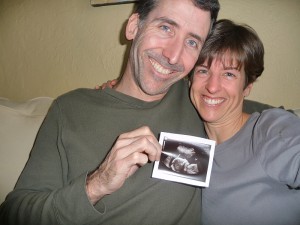My husband and I always wanted to be open with our son about his adoption and plan to share with him all that we know about his birth parents and his biological family. This open philosophy started before he even entered our lives with the ‘Dear Birthmother’ letter where we stated what our intention was for an open adoption. The moment our son entered into our lives we started sharing his story with him. As an infant of course he had no concept of what we were saying to him since he didn’t understand our words nor did he understand what an open adoption even was. But it didn’t matter that he didn’t understand us, we began telling his story anyway with pictures so that his being adopted would never be a surprise for him; it would simply be the way he always knew it.
We used one large picture initially to begin sharing his story. It was a painting actually commissioned by a local artist, of the five of us – Scott, myself, our son encircled in the foreground, with his birth parents embracing/dancing in the background. It is a playful, colorful and joyful piece of art that emanates love and happiness and tells our story simply. It sits above our couch in the living room and attracts attention the moment you enter that room. I love looking at the painting and it brings up so much emotion when I really spend time looking at it. Amazingly, our son has always been drawn to the painting as well without any prompting from us. From a very young age he would point to the painting and babble at it as he was drinking his bottle. Now, at 2 ½ he will occasionally point to the painting and tell us who everyone is.
In our son’s very early months, I also put together a picture book which allowed me to insert photos from my son’s birthday into a story book adapted from Debra Frasier’s book, “On the Day You Were Born.” (Coincidentally, his birthparents give him the complete version of that book on his birth date.) On one page of the picture book there is a drawing of a circle of people surrounding a newly born baby. On the opposite page I inserted the photo of Scott, myself and the birthfather all surrounding the baby and birthmother in the hospital bed. The spread couldn’t be more fitting. In other pages of the book I placed a picture from the church we were waiting in (across from the adoption agency) the morning of our son’s delivery; I included a copy of his footprints that were taken in the hospital on his birthday; and I also added our very special family photo also taken at the hospital. Before our son was talking we were showing him the pictures from the book and reading him the story of his birthday. Today, the picture book sits on the bookshelf in his bedroom ready to be looked at or read whenever he desires.
As our son matures we will begin adding more things to the story we tell him. For instance, it wasn’t until the last couple of months that we started talking more about how he came out of his birthmother’s tummy. One of our friends is pregnant with baby #2 so we used that opportunity to tell him there was a baby growing inside her tummy and that he came out of Lizzie, his birthmother’s, tummy. I’m quite certain that he doesn’t understand what this really means but I do know that he hears me because when prompted with the question, “Who’s tummy did you come out of?,” he always answers with “Lizzie.” The other night, Scott and I were looking at a map of the U.S. and I decided to point out where our son was born in comparison to where we live now (all the way across the country.) He was amused when I kept repeating, “We flew all the way over there to get you.”
It is fascinating to see our son’s comprehension expanding and to be able to share more and more details with him as time passes. I know at this point we’ve barely scraped the tip of the iceberg in regards to what he will eventually learn about his adoption story and about his biological family. But regardless, it is comforting to know that we’ve already planted the seeds for the bigger story that will eventually be told.
I heard a talk recently about the importance of being consistent with young children when retelling stories, even stories as simple as how they “tripped over a rock and scraped their knee in the park.” In the talk, the person mentioned that part of the reason that young kids repeat things that happen to them again and again and again is that they need confirmation that yes indeed that is the way that event happened, and by confirming their story it helps kids gain confidence and be comfortable in telling their own stories. So whether our son is repeating the “I tripped over a rock” story or the story surrounding his birth, it is all good because I know these stories are helping him gain confidence and be comfortable with his own stories in the long run.

